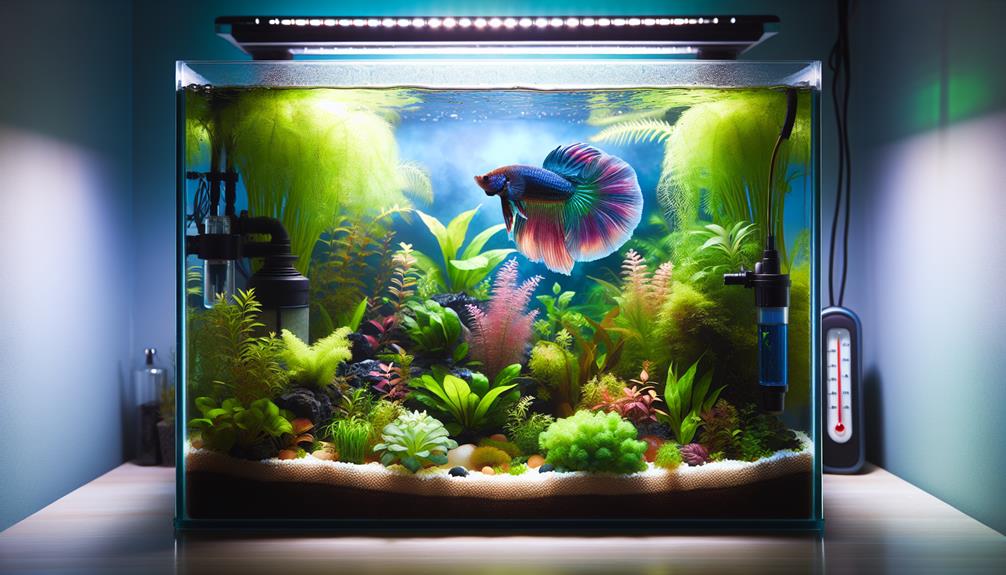What Are Some Proven Tips for Better Betta Fish Behavior?

When it comes to betta fish behavior, sometimes the smallest adjustments can yield the most significant results.
Have you ever considered that the size of your tank could impact how your betta behaves?
It’s fascinating to see how a few simple changes in their environment can lead to noticeable shifts in behavior.
Stay tuned to discover practical tips that can help enhance your betta fish’s well-being and overall demeanor.
Tank Size and Environment
To guarantee top behavior and well-being in your Betta fish, it’s essential to provide a roomy tank and a carefully curated environment. When considering tank decoration ideas, opt for smooth decorations to prevent fin tearing, such as silk plants or soft rocks. Avoid sharp edges or rough surfaces that could harm your Betta. Creating hiding spots with decorations like caves or plants is also critical to reduce stress in your fish.
For filtration system options, consider a sponge filter or a small internal filter as Betta fish prefer gentle water flow. These filters help maintain water quality by removing debris and waste, ensuring a healthy environment for your fish. Make sure to cycle the tank properly before introducing your Betta to prevent harmful ammonia spikes.
Proper Feeding Schedule
For best health and behavior in your Betta fish, establishing a proper feeding schedule is essential. Betta fish are known to be interactive creatures, displaying behavioral cues that can indicate their feeding response. When it comes to feeding techniques, it’s important to offer your Betta fish a dietary variety to make sure they receive all the necessary nutrients for top health.
To create a feeding schedule, consider feeding your Betta fish small amounts of food 2-3 times a day. This mimics their natural feeding habits in the wild, where they eat small meals frequently. Observing your Betta fish during feeding times can also provide insights into their feeding response. Some fish may swim to the surface when it’s feeding time, while others may be more reserved.
Tank Mates Selection
Selecting suitable tank mates for your Betta fish is important to maintain a harmonious aquatic environment. When considering tank mates for your Betta, compatibility is key. Betta fish are known for their aggression, especially towards fish with long fins or bright colors that may be mistaken for other Betta fish. To manage aggression, opt for tank mates that are important, such as certain species of tetras, corydoras catfish, or snails. Size ratios are significant when selecting tank mates. Avoid pairing your Betta with fish that are similar in size, as this can lead to territorial disputes. Instead, choose tank mates that are smaller and less likely to pose a threat.
When it comes to species combinations, look for fish that prefer different areas of the tank to reduce competition. For example, bottom-dwelling fish like shrimp or small catfish can be great companions for your Betta, as they occupy different levels of the tank. By carefully considering compatibility, aggression management, size ratios, and species combinations, you can create a peaceful community tank for your Betta fish.
Regular Water Quality Checks
When ensuring the well-being of your Betta fish, one essential aspect to prioritize is conducting regular water quality checks in your aquarium. Water parameters monitoring is vitally important to maintain a healthy environment for your Betta. Test the water regularly for pH levels, ammonia, nitrites, and nitrates to ensure they’re within safe ranges. Sudden changes in these parameters can stress your Betta and lead to health issues.
In addition to monitoring water quality, regular water changes are vitally important to keep the tank clean and maintain optimal conditions for your fish. Aim to change 25-50% of the water every 1-2 weeks, depending on the tank size and stocking levels. When changing the water, ensure it’s treated with a water conditioner to remove harmful chemicals like chlorine and chloramine.
A well-functioning filtration system is also essential for water quality. Clean or replace filter media regularly according to the manufacturer’s instructions to prevent buildup of debris and maintain efficient filtration. Proper tank maintenance, including vacuuming the substrate and removing any uneaten food, will contribute to a healthy aquatic environment for your Betta.
Enrichment Activities and Toys
Regularly engaging your Betta fish in enrichment activities and providing appropriate toys can greatly enhance their overall well-being and mental stimulation. Behavioral training is a fantastic way to interact with your Betta and improve their cognitive abilities. Training sessions can include teaching them to swim through hoops, follow your finger, or even play soccer with a small ball. These activities not only stimulate their minds but also strengthen the bond between you and your fish.
Interactive playtime is another key aspect of keeping your Betta fish entertained and engaged. Consider adding floating toys, mirrors, or plants to their tank to encourage exploration and mental stimulation. Betta fish are naturally curious and providing them with new objects to interact with can prevent boredom and decrease stress levels.
Remember to rotate the toys and activities regularly to keep the enrichment fresh and exciting for your Betta. By incorporating behavioral training and interactive playtime into your Betta fish’s routine, you can promote their well-being and overall happiness.
Conclusion
To sum up, by guaranteeing your betta fish has an appropriate tank size and environment, a proper feeding schedule, suitable tank mates, regular water quality checks, and enrichment activities, you can greatly improve their behavior and overall well-being.
These proven tips will help create a healthy and happy environment for your betta fish, allowing them to thrive and display their natural behaviors.
Remember to always prioritize the needs of your fish to guarantee a positive and enriching experience for both you and your betta.
